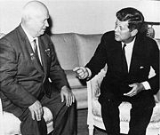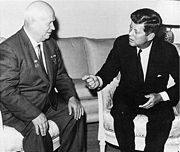
Vienna summit
Encyclopedia

Vienna
Vienna is the capital and largest city of the Republic of Austria and one of the nine states of Austria. Vienna is Austria's primary city, with a population of about 1.723 million , and is by far the largest city in Austria, as well as its cultural, economic, and political centre...
, Austria
Austria
Austria , officially the Republic of Austria , is a landlocked country of roughly 8.4 million people in Central Europe. It is bordered by the Czech Republic and Germany to the north, Slovakia and Hungary to the east, Slovenia and Italy to the south, and Switzerland and Liechtenstein to the...
between President
President of the United States
The President of the United States of America is the head of state and head of government of the United States. The president leads the executive branch of the federal government and is the commander-in-chief of the United States Armed Forces....
John F. Kennedy
John F. Kennedy
John Fitzgerald "Jack" Kennedy , often referred to by his initials JFK, was the 35th President of the United States, serving from 1961 until his assassination in 1963....
of the United States
United States
The United States of America is a federal constitutional republic comprising fifty states and a federal district...
and Premier
Premier of the Soviet Union
The office of Premier of the Soviet Union was synonymous with head of government of the Union of Soviet Socialist Republics . Twelve individuals have been premier...
Nikita Khrushchev
Nikita Khrushchev
Nikita Sergeyevich Khrushchev led the Soviet Union during part of the Cold War. He served as First Secretary of the Communist Party of the Soviet Union from 1953 to 1964, and as Chairman of the Council of Ministers, or Premier, from 1958 to 1964...
of the Soviet Union
Soviet Union
The Soviet Union , officially the Union of Soviet Socialist Republics , was a constitutionally socialist state that existed in Eurasia between 1922 and 1991....
. The leaders of the two superpower
Superpower
A superpower is a state with a dominant position in the international system which has the ability to influence events and its own interests and project power on a worldwide scale to protect those interests...
s of the Cold War
Cold War
The Cold War was the continuing state from roughly 1946 to 1991 of political conflict, military tension, proxy wars, and economic competition between the Communist World—primarily the Soviet Union and its satellite states and allies—and the powers of the Western world, primarily the United States...
era discussed numerous issues in the relationship between their countries.
Context
In November 1960, Kennedy had defeated U.S. Vice-President Richard NixonRichard Nixon
Richard Milhous Nixon was the 37th President of the United States, serving from 1969 to 1974. The only president to resign the office, Nixon had previously served as a US representative and senator from California and as the 36th Vice President of the United States from 1953 to 1961 under...
in the presidential election of that year. The Vienna summit was the first time Kennedy met the Soviet premier, and Khrushchev (who had been in power since Joseph Stalin
Joseph Stalin
Joseph Vissarionovich Stalin was the Premier of the Soviet Union from 6 May 1941 to 5 March 1953. He was among the Bolshevik revolutionaries who brought about the October Revolution and had held the position of first General Secretary of the Communist Party of the Soviet Union's Central Committee...
's death in 1953) was determined to prove his apparent superiority over the young and inexperienced Kennedy. The failed Bay of Pigs invasion
Bay of Pigs Invasion
The Bay of Pigs Invasion was an unsuccessful action by a CIA-trained force of Cuban exiles to invade southern Cuba, with support and encouragement from the US government, in an attempt to overthrow the Cuban government of Fidel Castro. The invasion was launched in April 1961, less than three months...
of April 1961, initially planned during the Eisenhower administration but finalized and carried out on Kennedy's watch, made Khrushchev all the more determined to display his apparent superiority over Kennedy.
The discussions were amicable, unlike the breakdown in talks between President Dwight D. Eisenhower
Dwight D. Eisenhower
Dwight David "Ike" Eisenhower was the 34th President of the United States, from 1953 until 1961. He was a five-star general in the United States Army...
and Khrushchev in 1960 over the U-2 incident in May of that year. Accordingly, there was a great deal of speculation before the summit as to whether it would be a success or not.
Discussions of the Summit
When the two men first met in Vienna, Kennedy somewhat awkwardly looked Khrushchev up and down several times, unable to hide his curiosity about the Soviet leader. The discussions touched on a range of topics, including the position of LaosLaos
Laos Lao: ສາທາລະນະລັດ ປະຊາທິປະໄຕ ປະຊາຊົນລາວ Sathalanalat Paxathipatai Paxaxon Lao, officially the Lao People's Democratic Republic, is a landlocked country in Southeast Asia, bordered by Burma and China to the northwest, Vietnam to the east, Cambodia to the south and Thailand to the west...
and the broader conflict in Indochina
Indochina
The Indochinese peninsula, is a region in Southeast Asia. It lies roughly southwest of China, and east of India. The name has its origins in the French, Indochine, as a combination of the names of "China" and "India", and was adopted when French colonizers in Vietnam began expanding their territory...
, nuclear disarmament
Nuclear disarmament
Nuclear disarmament refers to both the act of reducing or eliminating nuclear weapons and to the end state of a nuclear-free world, in which nuclear weapons are completely eliminated....
, and ideological musings. Discussions over Berlin
Berlin
Berlin is the capital city of Germany and is one of the 16 states of Germany. With a population of 3.45 million people, Berlin is Germany's largest city. It is the second most populous city proper and the seventh most populous urban area in the European Union...
, however, dominated the meeting.
Khrushchev threatened to sign a peace agreement with East Germany that would impinge on Western access to Berlin by turning over control of the access roads and air routes. However, though Kennedy stood firm on Western access to Berlin, he also placed unprecedented emphasis on the phrase ‘West Berlin’ during the summit and conveyed tacit acquiescence to Soviet actions in their sector of Berlin, including a possible border closure.
Khrushchev told Kennedy, "Force will be met by force. If the US wants war, that's its problem." "It's up to the US to decide whether there will be war or peace." "The decision to sign a peace treaty is firm and irrevocable, and the Soviet Union will sign it in December if the US refuses an interim agreement."
To this, Kennedy replied, "Then, Mr. Chairman, there will be a war. It will be a cold, long winter."
Outcomes
The summit was initially seen as a diplomatic triumph. Kennedy had refused to allow Soviet pressure to force his hand, or to influence the American policy of containmentContainment
Containment was a United States policy using military, economic, and diplomatic strategies to stall the spread of communism, enhance America’s security and influence abroad, and prevent a "domino effect". A component of the Cold War, this policy was a response to a series of moves by the Soviet...
. He had adequately stalled Khrushchev, and made it clear that the United States was not willing to compromise on a withdrawal from Berlin, whatever pressure Khrushchev may exert on the "testicles of the West" (as Khrushchev once called them).
However, it may seem, in retrospect, to have been a failure. The two leaders became increasingly frustrated at the lack of progress of the negotiations. After the summit, Khrushchev realized he had underestimated Kennedy. Kennedy, meanwhile, felt that he had to avoid giving the same impression of weakness which he had demonstrated before the summit, and felt he had demonstrated to Khrushchev during the summit. He later claimed of Khrushchev, "He beat the hell out of me" and told NYT reporter James ‘Scotty’ Reston it was the "worst thing in my life. He ravaged me."
In addition to conveying US reluctance to defend the full rights of Berlin’s citizens, Kennedy ignored his own cabinet officials’ advice to avoid ideological debate with Khrushchev. Khrushchev outmatched Kennedy in this debate, and came away believing he had triumphed in the summit over a weak and inexperienced leader. Observing Kennedy’s morose expression at the end of the summit, Khrushchev believed Kennedy "looked not only anxious, but deeply upset…I hadn’t meant to upset him. I would have liked very much for us to part in a different mood. But there was nothing I could do to help him…Politics is a merciless business.”
Part of the reason for Kennedy’s rather poor performance may have been the combination of drugs he was taking for back pain and other ailments. Following the prescriptions of Max Jacobson
Max Jacobson
Max Jacobson was a German-born New York physician, nicknamed "Dr. Feelgood" who administered dangerous levels of amphetamines and other medications to several high profile clients including American President John F...
(informally known as ‘Dr. Feelgood’), Kennedy was injecting himself with a drug cocktail that included hormones, steroids, animal organ cells, vitamins, enzymes, and amphetamines. Among the possible side effects were hyperactivity, nervousness, impaired judgment, and wild mood swings.
See also
- List of Soviet Union–United States summits (1943 to 1991)
External links
- Vienna Summit at Historycentral.com
- at U.S. Department of State
- "The Kennedy-Johnson, Scott W, Khrushchev Conference for Dummies: Remedial history for Barack Obama", Weekly Standard - 28 May 2008 @ 12:00:00 AM

